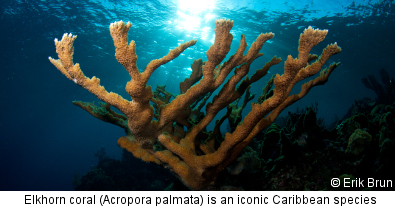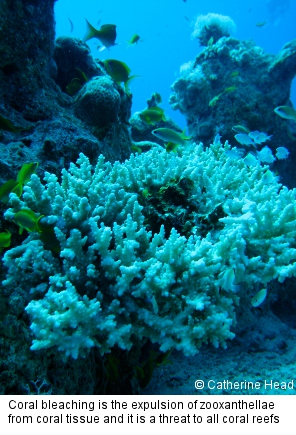EDGE launches a brand new conservation project: EDGE Coral Reefs! Scientists have highlighted 32 coral species that are on the EDGE of Existence.
Coral reefs are the most diverse marine ecosystem on earth but are threatened with functional extinction in the next 20 -50 years due predominantly to global climate change. In direct response to this the EDGE of Existence team are developing a new conservation programme focusing on EDGE coral species. Hard corals (order: Scleractinia) lay down the calcium carbonate structures of the reef and as such are the very foundation of the reef ecosystem, yet one third of all Scleractinian coral species are listed as threatened.
At an international conference in March 2010, scientists and conservationists came together at the Zoological Society of London to identify 10 of the most Evolutionarily Distinct and Globally Endangered coral species. After careful evaluation using the most comprehensive Scleractinian phylogeny available (Fukami et al, 2008) and expert opinion 32 species of Scleractinian coral from across the globe have been added to the new EDGE of Existence Coral reefs list and 10 of these species have been selected for future conservation attention by EDGE Fellows.
The EDGE team are now working towards identifying EDGE Fellows to conserve our 10 focal coral species helping to build in-country coral reef conservation capacity and to initiate conservation actions for these species. As the project develops over the next few months we will keep you updated through the website!
The species chosen for EDGE Coral reefs represent an extraordinary range of genetic diversity, growth forms and ecological adaptations and many have mutual relationships with the fish and invertebrates that live in coral reef habitats. The best known of all symbiotic relationships is between coral and algae called zooxanthellae that lives in the coral tissue and provides the coral with up to 80% of its nutritional needs!
Focal species picked for conservation include Mushroom coral (Heliofungia actiniformis) which is home to at least 15 shrimp species and to a pipefish which lives exclusively on mushroom coral. This species, along with another focal species, Elegance coral (Catalaphyllia jardinei) is popular in the aquarium trade but the effect of this harvest on the population is unknown and needs reviewing.
Elliptical star coral (Dichocoenia stokesii) is a Caribbean coral particularly susceptible to white plague disease, one of many diseases affecting coral globally. Coral diseases are exacerbated by poor water quality, high water temperatures and coral bleaching, threats which are occurring more frequently as the global climate changes and coastal populations grow.
An iconic species whose population has declined dramatically in recent years due to disease and bleaching is Elkhorn coral (Acropora palmata). This species is also exceptionally vulnerable to storm damage and as the global climate changes the frequency and intensity of storms may increase causing further declines to the population.
In addition to coral disease and coral bleaching all corals are also threatened by ocean acidification, the change in ocean pH as atmospheric carbon dioxide levels increases. Ocean acidification makes the calcium carbonate skeletons of coral brittle and slower to grow and there could be an irreversible decline in coral reefs by 2040 if the rise in carbon emissions is not addressed immediately.
Over half a billion people depend on coral reefs for food and income and if coral reefs are lost, the planet will lose an important and exceptionally beautiful ecosystem. EDGE Coral reefs will help promote the conservation of the world’s most evolutionarily distinct and globally endangered coral species and the habitats in which they are found before it becomes too late to save these species.
If you would like to contribute to the conservation of coral reefs you can visit the How You Can Help page or donate to the EDGE of Existence programme.



